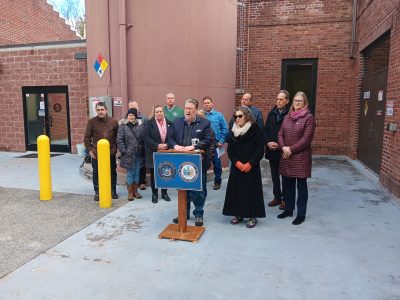Harckham, Levenberg Fight to Restore Money for Clean Water Projects
News Based on facts, either observed and verified directly by the reporter, or reported and verified from knowledgeable sources.

Two local state legislators demanded last weekend that Gov. Kathy Hochul fully restore clean water funding for the state’s 2024-25 budget that she has proposed to slash by 50 percent.
State Sen. Peter Harckham (D-Lewisboro) was joined by Assemblywoman Dana Levenberg (D-Ossining) last Saturday morning at Ossining’s Indian Brook Water Treatment Plant to call on Hochul to fully fund the $500 million that has been provided each year since 2019 through the New York Clean Water Infrastructure Act. Ossining municipal officials, environmental advocates and labor leaders also gathered to lobby for restoration of the fund.
Instead, Hochul has proposed $250 million for the upcoming fiscal year, which was supposed to start Apr. 1, but Albany has so far failed to reach agreements on key budget issues, including Foundation Aid for schools and housing.
Lawmakers and others in attendance characterized the $250 million as woefully inadequate.
“It is not enough,” Harckham said. “We know we have billions of dollars in need. I can spend $500 million in water infrastructure (projects) in my district tomorrow.”
Levenberg said making sure there is clean and safe water is the most obvious concern, but the governor’s housing goals will be difficult to achieve unless there is a sufficient supply of clean water to bring to residences. Harckham added that water infrastructure projects across the state will also result in thousands of good-paying union jobs that will boost the state’s economy.
“The number one issue that I hear from our community leaders, our municipal officials every day is that we don’t have the infrastructure that we need,” Levenberg said. “And what they’re talking about mostly is the clean water and sewer infrastructure. We need the infrastructure to support housing, to support people to live in there.”
The Indian Brook plant, built in 1986, is in need of significant upgrades, in part due to stiffer federal Environmental Protection Agency (EPA) guidelines, many of which have been put in place following the Flint, Mich. water crisis that began 10 years ago this month.
Ossining Town Supervisor Liz Feldman said what started out as a roughly $40 million project to build a new water treatment plant has ballooned to close to $100 million due mainly to inflation and cost escalation following the pandemic. The town has received only about $5 million in state grants so far.
Andrew Tiess, Ossining’s water superintendent said stricter guidelines for lead and copper levels in drinking water will force the plant to have upgrades done. There is also concern throughout the state about levels of PFAS, although that is mainly for those with well water, he said.
“We don’t have that issue here, but as the EPA guidelines change that will be a factor,” Tiess said.
Environmental advocates said protecting the safety of water is one of the most fundamental responsibilities of government. Tracy Brown, president of Riverkeeper, said New York State has the highest infrastructure deficit in the U.S, and with $80 billion of needs that have been identified already, it would be counterproductive to reduce half of the water infrastructure funding for the new fiscal year.
“The idea of cutting that in half now when we finally have a program that works and is growing numbers and is delivering clean water and green jobs, it makes absolutely no sense,” said Brown, who added the funding should be increased to $600 million.
Harckham said the head of one state agency had suggested that because the state’s voters passed the $4.2 billion Environmental Bond Act in 2022, money in the budget could be peeled off during challenging fiscal times. The bond issue from two years ago was meant to supplement, not supplant, the $500 million annual investment, he said.
“The thought and the intent was to do this in perpetuity, $500 million annually, so this should not be one of these things where that’s the sacrificial lamb in the case of fiscal controversies,” Harckham said. “This is as basic as it gets, investing in clean drinking water.”

Martin has more than 30 years experience covering local news in Westchester and Putnam counties, including a frequent focus on zoning and planning issues. He has been editor-in-chief of The Examiner since its inception in 2007. Read more from Martin’s editor-author bio here. Read Martin’s archived work here: https://www.theexaminernews.com/author/martin-wilbur2007/
